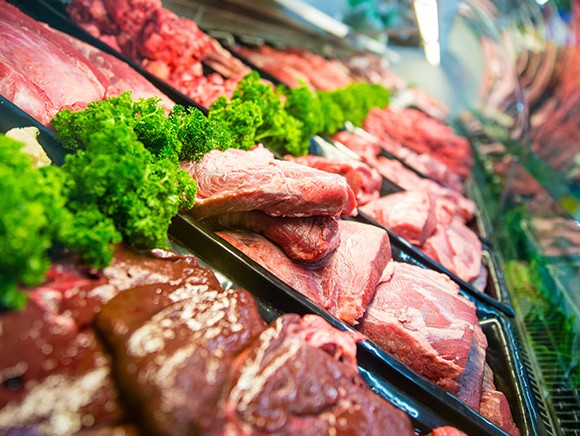
The Netherlands’ Central Organisation for the Meat Sector (COV) presented its vision of the future at the end of December 2016. The organisation is keen for Dutch society to once again take pride in a sector that is leading the way internationally in terms of the sustainable and honest production of meat and for confidence in the sector to be restored. COV chair Jos Goebbels: “This report shows the huge power of the sector.”
“All too often, the meat sector is presented in a negative light,” said Goebbels in a discussion shortly after the official presentation of the report. “You rarely read about how strong the sector is, even though the meat sector is our country’s biggest food exporter with a turnover of approximately EUR10 billion, or that the industry directly employs around 12,000 people. Meat usually only hits the headlines when there are incidents or issues.” If the exception rather than the rule has become the norm in the general public’s eyes, then that’s an injustice to the industry’s achievements, to the dedication and passion of scores of entrepreneurs and their thousands of employees,” according to the COV.
The vision document titled 2025: De Nederlandse vleessector in balans (‘2025: The Dutch meat sector in balance’) was put together by consultancy firm Roland Berger following various sessions with COV members. “We see this as our ‘commitment Bible’,” explains the chairman. “We indicate the areas in which the COV and our members are taking the initiative and shouldering the responsibility in order to achieve the goals in the report.” He emphasises that it is not just a collection of voluntary ambitions and goals: “The vision has broad support among all our members; they stick to the agreements. Moreover, we will be taking the pulse of the sector annually from now on. Each year, we are going to be publishing a report in which we cover the concrete achievements, the initiatives and the plans for the year ahead.” There is no doubt that the growing demand for animal proteins in the Netherlands can only be met in a sustainable manner. “It is crucial to maintain a licence to produce – and that requires innovations and investments in all links of the chain.”
The document detailing the vision for 2025 is built up around six themes: Transparency and integrity; Quality of product and process; Animal welfare and health; International market position; Sustainability; and Knowledge and innovation. The common thread running through the themes is ‘finding the right balance’ –between economic contribution and environmental impact, and between local and international. Goebbels: “We talk about safeguarding the integrity and working on more transparency, but also about further strengthening quality systems (including in the chain). In concrete terms, over the next ten years we will be further reducing the sector’s emissions and energy consumption, to at least 30% less than in 2015. In terms of our suppliers, it is on our agenda to banish the use of antibiotics from cattle farming as a way of helping to solve the resistance problem.”
When it comes to the theme of sustainability, helping to find a solution to the Dutch manure problem is high on the agenda, because manure has a major effect on the social acceptance of – and hence support for – the Dutch meat chain. One tangible target for 2025 is to process 50% of the manure into a valuable raw material.
Cattle farmers along with the cattle feed, dairy and meat sector must join forces to realise profitable and sustainable manure processing solutions and to make cattle feed even more sustainable. In turn, the sector is asking the government to create the right conditions to accelerate the solution to the manure problem before it’s too late. “All the parties mentioned stand to benefit from the manure problem being solved. Without a solution, the future of the entire Dutch agri-food cluster is at risk,” states the report. Much is being done already. During the presentation, for example, Hennie Swinkels from VanDrie Group explained about a project that they are doing together with Wageningen UR. The project members are looking for an efficient way of filtering phosphate, amino acids and minerals out of veal manure and making the substances suitable for re-use.
Returning to the issue of social acceptance, Goebbels calls it ‘a tricky matter’. “How can the sector respond to the contradiction between what people say that they want as citizens – sustainability, animal welfare, chain transparency and so on – and what they do as consumers: their unwillingness to pay a higher price for those things? Most shoppers choose the cheap options. That’s why a societal discussion is needed – not only for the meat sector, but much more broadly. Therefore, over the coming months, we will be seeking dialogue with and talking to the likes of CBL and the Dutch Consumer Association, but also with NGOs. That necessitates openness and transparency about what we do and what the meat sector stands for.”
“The dairy sector is often praised for its innovative nature,” he continues. “People point out how many product variations there are in the dairy category. But just take a look at the meat department at a butcher’s or supermarket – at how many different products and flavours are available there. And just look at the sales revenue, the innovative strength and the number of jobs in the meat sector. By showing people what the sector does and by entering into dialogue with society, we want to regain social support for meat production. It’s time to cast off the cloak of shame,” concludes Jos Goebbels.
‘Click here for the report 2025: De Nederlandse vleessector in balans (in Dutch only)
Source: © ESB Professional/Shutterstock.com